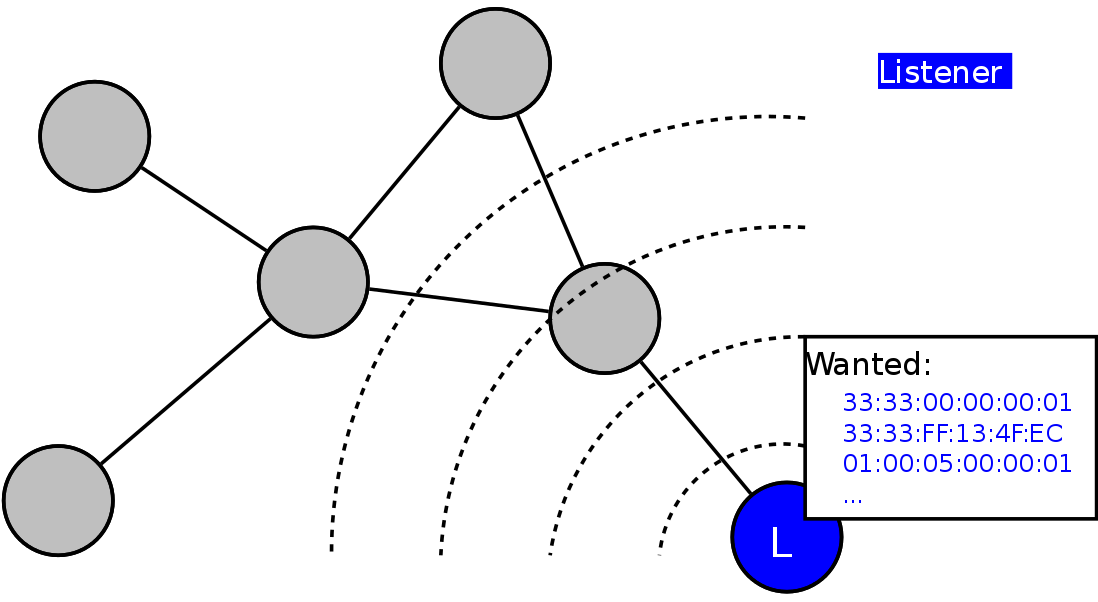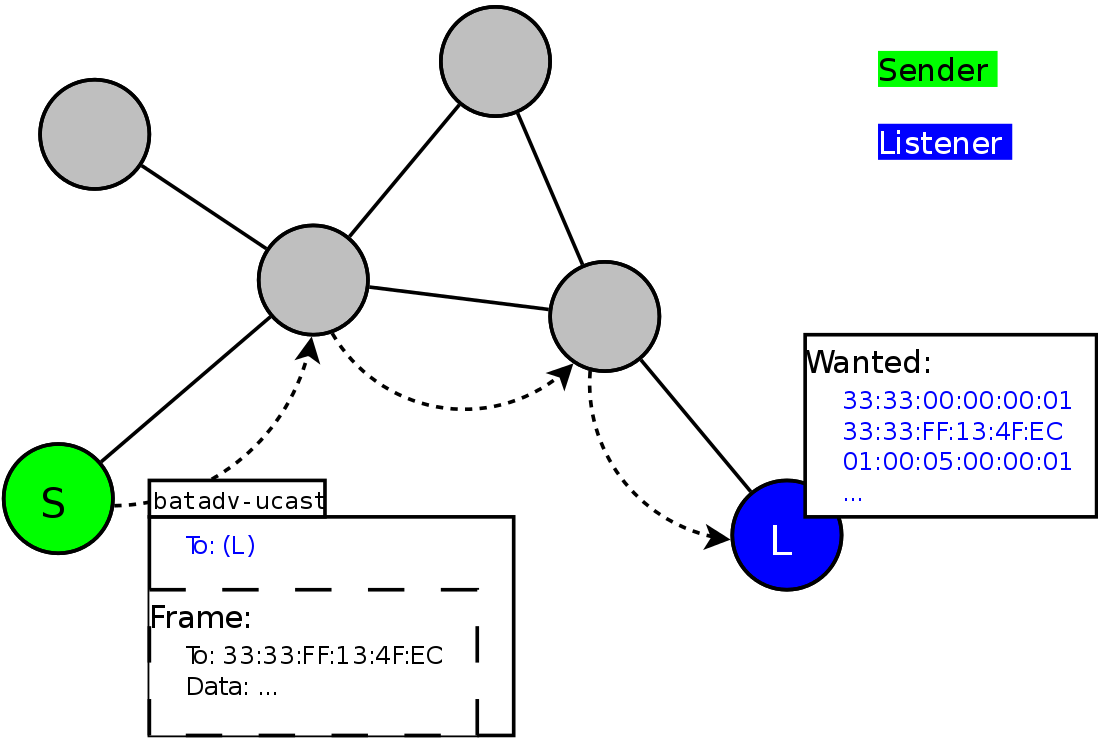Multicast Optimizations – Technical Description¶
Prior Readings:
Multicast Listener Announcements¶

The IPv4/IPv6 multicast code in the Linux kernel keeps track of any of its applications requesting to receive multicast packets for a certain group.
batman-adv queries this local database and announces these so called multicast listeners, more precisely the according multicast MAC addresses, to the rest of the mesh network via the translation table infrastructure.
Multicast TVLV¶
A node capable of performing Multicast Listener Announcements signalizes this by attaching a Multicast TVLV to its OGMs.
Multicast TVLV format¶
0 1 2 3 0 1 2 3 4 5 6 7 8 9 0 1 2 3 4 5 6 7 8 9 0 1 2 3 4 5 6 7 8 9 0 1 2 +-+-+-+-+-+-+-+-+-+-+-+-+-+-+-+-+-+-+-+-+-+-+-+-+-+-+-+-+-+-+-+-+ | MCAST Flags | Reserved | +-+-+-+-+-+-+-+-+-+-+-+-+-+-+-+-+-+-+-+-+-+-+-+-+-+-+-+-+-+-+-+-+
BATADV_MCAST_WANT_ALL_UNSNOOPABLES (Bit 0):¶
Signalizes that this node wants all unsnoopable multicast traffic, that is traffic destined to the all-nodes address for IPv6 (ff02::1) and to link-local addresses for IPv4 (224.0.0.0/24). This is usually the case when a node uses a bridge device on top of bat0 and is therefore unable to detect potential bridged-in listeners.
BATADV_MCAST_WANT_ALL_IPV4 (Bit 1):¶
Signalizes that this node wants all IPv4 multicast traffic. This is usually the case when a node uses a bridge device on top of bat0, has an IGMP querier (no matter if IGMPv2 or IGMPv3) behind it and is therefore not able to reliably determine all of its IGMPv2 listeners.
BATADV_MCAST_WANT_ALL_IPV6 (Bit 2):¶
Signalizes that this node wants all IPv6 multicast traffic. This is usually the case when a node uses a bridge device on top of bat0, has an MLD querier (no matter if MLDv1 or MLDv2) behind it and is therefore not able to reliably determine all of its MLDv1 listeners.
BATADV_MCAST_WANT_NO_RTR4 (Bit 3):¶
Signalizes that we have no IPv4 multicast router and therefore only need routable IPv4 multicast packets we signed up for explicitly.
BATADV_MCAST_WANT_NO_RTR6 (Bit 4):¶
Signalizes that we have no IPv6 multicast router and therefore only need routable IPv6 multicast packets we signed up for explicitly.
BATADV_MCAST_HAVE_MC_PTYPE_CAPA (Bit 5):¶
Signalizes that:
- This node is capable of receiving, parsing and forwarding a batman-adv multicast packet with a multicast tracker TVLV.
- All hard interfaces of this node have an MTU of at least 1280.
Bits 6 to 7:¶
reserved for future extensions
Multicast Sender¶

Optimization for IPv4 or IPv6 multicast packets is performed by considering a few special cases. First, the number of nodes interested in a group is counted. Interest has been announced by either including the multicast group in TT entries, or setting the BATADV_MCAST_WANT_ALL_IPV4 or BATADV_MCAST_WANT_ALL_IPV6 flags or the BATADV_MCAST_WANT_ALL_UNSNOOPABLES flag in case of unsnoopable ranges in the Multicast TVLV flag.
For routable IP multicast destinations the amount of multicast routers, signaled via the absence of either the BATADV_MCAST_WANT_NO_RTR4 or BATADV_MCAST_WANT_NO_RTR6 flags, is further included in the count (see below for details).
If the total number of nodes interested in a group is:
- ... 0, then this frame can be safely dropped.
- >= 1, then this frame is encapsulated in and forwarded, in this order of priority, either via:
- a batman-adv multicast packet to the according destination(s) - if the count and available headroom allows it
- batman-adv unicast packet(s) to the according destination(s) - if the count and multicast-fanout setting allows it
- batman-adv broadcast packet and forwarded via classic flooding to all nodes.
The latter case is the general fallback to broadcast, which is also used when the the multicast optimization is turned off.
Handling rules depending on multicast address¶
Depending on the IP destination of the multicast packet and the flags of other nodes, there are various limitations and exceptions. If multicast optimization is not supported for whatever reason, the packets will be sent as broadcast as a fallback solution.
| address range | address family | |
| IPv4 | IPv6 | |
| all nodes link-scope | supported without bridges¹. Example: 224.0.0.1 (all nodes) |
supported without bridges¹. Example: ff02::1 (all nodes) |
| link-local (excl. all nodes addr.) |
supported without bridges¹. Example: 224.0.0.251 (mDNS) |
supported². Example: ff12::39 (locally administrated) |
| routable | supported³. Example: 239.1.2.3 (locally administrated) |
supported²⁴. Example: ff0e::101 (NTP) |
¹: These addresses cannot be considered for optimization towards nodes which have a bridge interface on top of their batman interface as they are not snoopable. See multicast-optimizations-flags for details.
²: In bridged scenarios, an IGMP/MLD querier needs to be present in the mesh. Also, a 3.17 kernel or newer is required.
³: Routable IPv4 multicast addresses in bridged scenarios require a 5.14 kernel or newer and batman-adv 2021.2 or newer. Before that only supported without bridges.
⁴: With a 5.14 kernel or newer and batman-adv 2021.2 or newer proper MRD support is used to detect multicast routers. Otherwise with batman-adv v2019.3 until v2021.1 multicast routers are "guessed" by listeners on ff02::2. Which will "overestimate" by including unicast routers without multicast routing, too.
For details on IPv4 and IPv6 multicast address ranges check out this detailed article on Wikipedia.
Routable multicast addresses¶
For routable multicast addresses, further consideration has to be given: The according multicast packets not only need to be forwarded to any multicast listener on the local link, but to any multicast router, too. Otherwise off-link listeners, which are only reachable via a layer 3 multicast router, would not receive these multicast packets anymore. batman-adv detects node local multicast routers through /proc/sys/net/<ipv4|ipv6>/conf/<iface>/mc_forwarding and uses a bridge's Multicast Router Discovery capabilities for bridged-in hosts.
Limitations¶
- groups with more listeners (+routers) than #multicast-fanout (default: 16) don't get optimized
- optimization for link-local IPv4 (224.0.0.0/24) or all-nodes IPv6 multicast (ff02::1) is only done if no node announces BATADV_MCAST_WANT_ALL_UNSNOOPABLES, that is no node configures a bridge on batman-adv.
- no awareness for source-specific multicasts
- multicast packets over VLANs are always flooded
Next Steps / Roadmap¶
- optimization for groups with many members:
- implement path tracking and use these patches (see Multicast-ideas-updated) or
- implement generic (but esp. for MCAST Tracker TVLV) TVLV->hash compression/caching
- implement some faster listener roaming mechanism for bridged in hosts (for instance announce (multicast-address, source address) pairs and use general TT roaming mechanism)
- implement source-specific multicast in batman-adv
- multicast TT announcements and forwarding have to be performed per VLAN
- ...
Further Readings¶